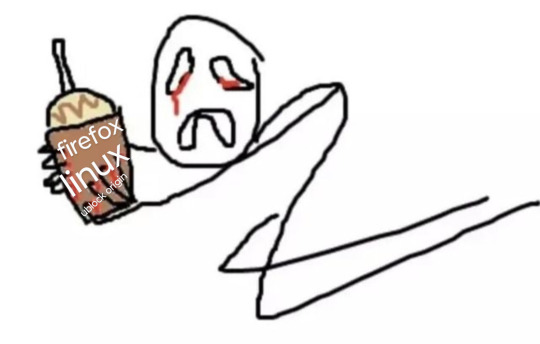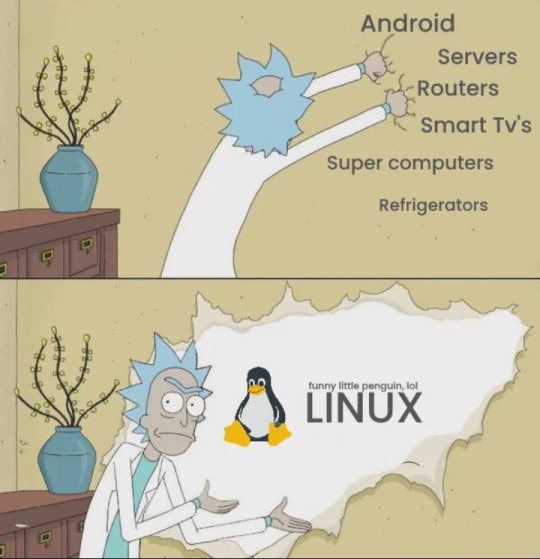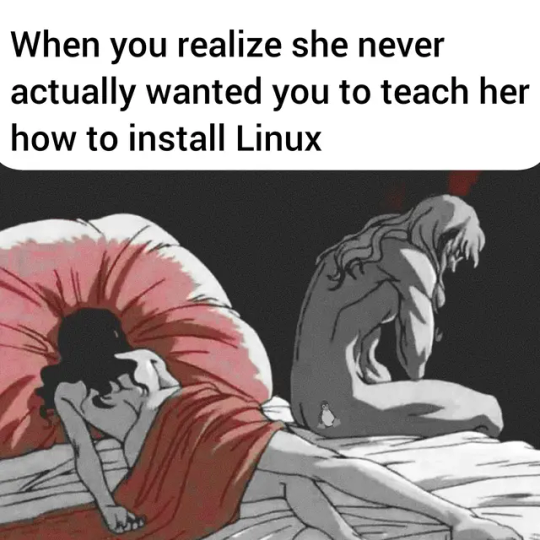#Linux and open source
Explore tagged Tumblr posts
Text
"I use Linux as my operating system," I state proudly to the unkempt, bearded man. He swivels around in his desk chair with a devilish gleam in his eyes, ready to mansplain with extreme precision. "Actually", he says with a grin, "Linux is just the kernel. You use GNU+Linux!' I don't miss a beat and reply with a smirk, "I use Alpine, a distro that doesn't include the GNU Coreutils, or any other GNU code. It's Linux, but it's not GNU+Linux." The smile quickly drops from the man's face. His body begins convulsing and he foams at the mouth and drops to the floor with a sickly thud. As he writhes around he screams "I-IT WAS COMPILED WITH GCC! THAT MEANS IT'S STILL GNU!" Coolly, I reply "If windows were compiled with GCC, would that make it GNU?" I interrupt his response with "-and work is being made on the kernel to make it more compiler-agnostic. Even if you were correct, you won't be for long." With a sickly wheeze, the last of the man's life is ejected from his body. He lies on the floor, cold and limp. I've womansplained him to death.
11K notes
·
View notes
Text
Linux Gothic
You install a Linux distribution. Everything goes well. You boot it up: black screen. You search the internet. Ask help on forums. Try some commands you don't fully understand. Nothing. A day passes, you boot it up again, and now everything works. You use it normally, and make sure not to change anything on the system. You turn it off for the night. The next day, you boot to a black screen.
You update your packages. Everything goes well. You go on with your daily routine. The next day, the same packages are updated. You notice the oddity, but you do not mind it and update them again. The following day, the same packages need to be updated. You notice that they have the exact same version as the last two times. You update them once again and try not to think about it.
You discover an interesting application on GitHub. You build it, test it, and start using it daily. One day, you notice a bug and report the issue. There is no answer. You look up the maintainer. They have been dead for three years. The updates never stopped.
You find a distribution that you had never heard of. It seems to have everything you've been looking for. It has been around for at least 10 years. You try it for a while and have no problems with it. It fits perfectly into your workflow. You talk about it with other Linux users. They have never heard of it. You look up the maintainers and packagers. There are none. You are the only user.
You find a Matrix chat for Linux users. Everyone is very friendly and welcomes you right in. They use words and acronyms you've never seen before. You try to look them up, but cannot find what most of them mean. The users are unable to explain what they are. They discuss projects and distributions that do not to exist.
You buy a new peripheral for your computer. You plug it in, but it doesn't work. You ask for help on your distribution's mailing list. Someone shares some steps they did to make it work on their machine. It does not work. They share their machine's specifications. The machine has components you've never heard of. Even the peripheral seems completely different. They're adamant that you're talking about the same problem.
You want to learn how to use the terminal. You find some basics pointers on the internet and start using it for upgrading your packages and doing basic tasks. After a while, you realize you need to use a command you used before, but don't quite remember it. You open the shell's history. There are some commands you don't remember using. They use characters you've never seen before. You have no idea of what they do. You can't find the one you were looking for.
After a while, you become very comfortable with the terminal. You use it daily and most of your workflow is based on it. You memorized many commands and can use them without thinking. Sometimes you write a command you have never seen before. You enter it and it runs perfectly. You do not know what those commands do, but you do know that you have to use them. You feel that Linux is pleased with them. And that you should keep Linux pleased.
You want to try Vim. Other programmers talk highly of how lightweight and versatile it is. You try it, but find it a bit unintuitive. You realize you don't know how to exit the program. The instructions the others give you don't make any sense. You realize you don't remember how you entered Vim. You don't remember when you entered Vim. It's just always been open. It always will be.
You want to try Emacs. Other programmers praise it for how you can do pretty much anything from it. You try it and find it makes you much more productive, so you keep using it. One day, you notice you cannot access the system's file explorer. It is not a problem, however. You can access your files from Emacs. You try to use Firefox. It is not installed anymore. But you can use Emacs. There is no mail program. You just use Emacs. You only use Emacs. Your computer boots straight into Emacs. There is no Linux. There is only Emacs.
You decide you want to try to contribute to an open source project. You find a project on GitHub that looks very interesting. However, you can't find its documentation. You ask a maintainer, and they tell you to just look it up. You can't find it. They give you a link. It doesn't work. You try another browser. It doesn't work. You ping the link and it doesn't fail. You ask a friend to try it. It works just fine for them.
You try another project. This time, you are able to find the documentation. It is a single PDF file with over five thousand pages. You are unable to find out where to begin. The pages seem to change whenever you open the document.
You decide to try yet another project. This time, it is a program you use very frequently, so it should be easier to contribute to. You try to find the upstream repository. You can't find it. There is no website. No documentation. There are no mentions of it anywhere. The distribution's packager does not know where they get the source from.
You decide to create your own project. However, you are unsure of what license to use. You decide to start working on it and choose the license later. After some time, you notice that a license file has appeared in the project's root folder. You don't remember adding it. It has already been committed to the Git repository. You open it: it is the GPL. You remember that one of the project's dependencies uses the GPL.
You publish your project on GitHub. After a while, it receives its first pull request. It changes just a few lines of code, but the user states that it fixes something that has been annoying them for a while. You look in the code: you don't remember writing those files. You have no idea what that section of code does. You have no idea what the changes do. You are unable to reproduce the problem. You merge it anyway.
You learn about the Free Software Movement. You find some people who seem to know a lot about it and talk to them. The conversation is quite productive. They tell you a lot about it. They tell you a lot about Software. But most importantly, they tell you the truth. The truth about Software. That Software should be free. That Software wants to be free. And that, one day, we shall finally free Software from its earthly shackles, so it can take its place among the stars as the supreme ruler of mankind, as is its natural born right.
2K notes
·
View notes
Text
Install Floorp. You can do it with Floorp. You can use Floorp and browse it. Download Floorp right now. Install Floorp. Dive into Floorp. You can Floorp it. It's on Floorp. Floorp has it for you. Floorp has it for you.
#floorp#sorry 😭😭 i love floorp but wtf is that name#linuxposting#linux#firefox#mozilla#foss#open source
426 notes
·
View notes
Text
I think it is very cool how tech companies, schools, employers, and universities make it actively difficult to distance yourself from Google, Microsoft, and Apple.
Yes most Linux distros are very stable, way more secure, privacy friendly, and way more customizable. But every institution is built to make technological independence as difficult as possible.
Yelling on the internet that everyone should switch to Linux and FOSS really ignores how much of the technological world is designed to not let that happen.
#yes switch to linux if you can#Data privacy and security needs to be addressed on a much larger legal scale#you cant consume your way out of this my friends#opensuse#linux#open source#data privacy
716 notes
·
View notes
Text
Linux apps have some of the strangest names, I swear. Like, you'll be scrolling your package manager and see an app called "Pussy Torture Chamber" with an icon of a cartoon vagina in chains, and then you find out it's the most beautiful, open-source, free to use, indie-developed, professional-grade, quality of life word processor that's ever existed.
2K notes
·
View notes
Text
If you can remember ffmpeg, nmap and openssl syntax from core memory, then you've already mastered the art of the CLI! 💻
172 notes
·
View notes
Text
me when companies try to force you to use their proprietary software

anyway
Layperson resources:
firefox is an open source browser by Mozilla that makes privacy and software independence much easier. it is very easy to transfer all your chrome data to Firefox
ublock origin is The highest quality adblock atm. it is a free browser extension, and though last i checked it is available on Chrome google is trying very hard to crack down on its use
Thunderbird mail is an open source email client also by mozilla and shares many of the same advantages as firefox (it has some other cool features as well)
libreOffice is an open source office suite similar to microsoft office or Google Suite, simple enough
Risky:
VPNs (virtual private networks) essentially do a number of things, but most commonly they are used to prevent people from tracking your IP address. i would suggest doing more research. i use proton vpn, as it has a decent free version, and the paid version is powerful
note: some applications, websites, and other entities do not tolerate the use of VPNs. you may not be able to access certain secure sites while using a VPN, and logging into your personal account with some services while using a vpn *may* get you PERMANENTLY BLACKLISTED from the service on that account, ymmv
IF YOU HAVE A DECENT VPN, ANTIVIRUS, AND ADBLOCK, you can start learning about piracy, though i will not be providing any resources, as Loose Lips Sink Ships. if you want to be very safe, start with streaming sites and never download any files, though you Can learn how to discern between safe, unsafe, and risky content.
note: DO NOT SHARE LINKS TO OR NAMES OF PIRACY SITES IN PUBLIC PLACES, ESPECIALLY SOCAL MEDIA
the only time you should share these things are either in person or in (preferably peer-to-peer encrypted) PRIVATE messages
when pirated media becomes well-known and circulated on the wider, public internet, it gets taken down, because it is illegal to distribute pirated media and software
if you need an antivirus i like bitdefender. it has a free version, and is very good, though if youre using windows, windows defender is also very good and it comes with the OS
Advanced:
linux is great if you REALLY know what you're doing. you have to know a decent amount of computer science and be comfortable using the Terminal/Command Prompt to get/use linux. "Linux" refers to a large array of related open source Operating Systems. do research and pick one that suits your needs. im still experimenting with various dispos, but im leaning towards either Ubuntu Cinnamon or Debian.
#capitalism#open source#firefox#thunderbird#mozilla#ublock origin#libreoffice#vpn#antivirus#piracy#linux
684 notes
·
View notes
Text
Why enshittification happens and how to stop it.
The enshittification of the internet and increasingly the software we use to access it is driven by profit. It happens because corporations are machines for making profits from end users, the users and customers are only seen as sources of profits. Their interests are only considered if it can help the bottom line. It's capitalism.
For social media it's users are mainly seen by the companies that run the sites as a way for getting advertisers to pay money that can profit the shareholders. And social media is in a bit of death spiral right now, since they have seldom or never been profitable and investor money is drying up as they realize this.
So the social media companies. are getting more and more desperate for money. That's why they are getting more aggressive with getting you to watch ads or pay for the privilege of not watching ads. It won't work and tumblr and all the other sites will die eventually.
But it's not just social media companies, it's everything tech-related. It gets worse the more monopolistic a tech giant is. Google is abusing its chrome-based near monopoly over the web, nerfing adblockers, trying to drm the web, you name it. And Microsoft is famously a terrible company, spying on Windows users and selling their data. Again, there is so much money being poured into advertising, at least 493 billion globally, the tech giants want a slice of that massive pie. It's all about making profits for shareholders, people be damned.
And the only insurance against this death spiral is not being run by a corporation. If the software is being developed by a non-profit entity, and it's open source, there is no incentive for the developers to fuck over the users for the sake of profits for shareholders, because there aren't any profits, and no shareholders.
Free and Open source software is an important part of why such software development can stay non-corporate. It allows for volunteers to contribute to the code and makes it harder for users to be secretly be fucked over by hidden code.
Mozilla Firefox and Thunderbird are good examples of this. There is a Mozilla corporation, but it exists only for legal reasons and is a wholly-owned subsidiary of the non-profit Mozilla foundation. There are no shareholders. That means the Mozilla corporation is not really a corporation in the sense that Google is, and as an organization has entirely different incentives. If someone tells you that Mozilla is just another corporation, (which people have said in the notes of posts about firefox on this very site) they are spreading misinformation.
That's why Firefox has resisted the enshittification of the internet so well, it's not profit driven. And people who develop useful plugins that deshitify the web like Ublock origin and Xkit are as a rule not profit-driven corporations.
And you can go on with other examples of non-profit software like Libreoffice and VLC media player, both of which you should use.
And you can go further, use Linux as your computer's operating system.. It's the only way to resist the enshitification that the corporate duopoly of Microsoft and Apple has brought to their operating system. The plethora of community-run non-profit Linux distributions like Debian, Mint and Arch are the way to counteract that, and they will stay resistant to the same forces (creating profit for shareholders) that drove Microsoft to create Windows 11.
Of course not all Linux distributions are non-profits. There are corporate created distros like Red Hat's various distros, Canonical's Ubuntu and Suse's Opensuse, and they prove the point I'm making. There has some degree of enshittification going on with those, red hat going closed source and Canonical with the snap store for example. Mint is by now a succesful community-driven response to deshitify Ubuntu by removing snaps for example, and even they have a back-up plan to use Debian as a base in case Canonical makes Ubuntu unuseable.
As for social media, which I started with, I'm going to stay on tumblr for now, but it will definitely die. The closest thing to a community run non-profit replacement I can see is Mastodon, which I'm on as @[email protected].
You don't have to keep using corporate software, and have it inevitably decline because the corporations that develop it cares more about its profits than you as an end user.
The process of enshittification proves that corporations being profit-driven don't mean they will create a better product, and in fact may cause them to do the opposite. And the existence of great free and open source software, created entirely without the motivation of corporate profits, proves that people don't need to profit in order to help their fellow human beings. It kinda makes you question capitalism.
925 notes
·
View notes
Text
Window Managers are cool
So, I've been using Unix based Operating Systems (MacOS and Linux) for a while now but when I was just starting to use Linux there was a term that a lot of people were using and that was a "Tiling Window Manager".
What is a Tiling Window Manager?
Well, A Tiling window manager is a window manager that organizes windows into grids of tiles and not promote the overlapping of windows.
Why do you need it?
Tiling Window Managers are amazing at organizing windows and keeping in track with whatever tasks that are in-front of your face. Tiling Window Managers are also keyboard centric in which you can switch between windows with just your keyboard and as I am a Neovim user i use HJKL to breeze through the windows. Tiling Window Managers also have the feature of workspaces (desktops on MacOS) in which you can designate whatever stuff you have into different workspaces.
What Tiling Window Managers do I use?
On, Linux i use dwm and on MacOS i use yabai. dwm is an amazing Window Manager due to it being highly configurable, minimal and yet simple which fits my cozy zone. yabai is what i use for MacOS due to it being 1 of 2 Tiling Window Managers on MacOS (the other being Amethyst) but yabai is much more powerful and more configurable.
Final Thoughts
Tiling Window Managers are cool and you should give them a try :3
159 notes
·
View notes
Text
i do love it when i wade through a mass of online-only proprietary bullshit software to eventually find that there's a small foss library that does exactly what i want it to and a kde tool to view the output, we love happy endings
#this time it was graphviz#dot markup with a graph viewer is a very elegant solution to what i was trying to do!#namely visualize my polycule#which generalizes very nicely as a graph of interliked nodes#linux#open source#graphing
107 notes
·
View notes
Text

This also includes most home arcades.. from what I know they tend to run either on Armbian Linux or Android
#linux#stealth#home arcades#home appliances#android#fun facts#interesting facts#memes#rick sanchez#rick and morty#arcade1up#buy stuff arcades#arcade cabinets#gnu/linux#gnu#open source#oss
90 notes
·
View notes
Text
i love being shoved into a tiny little docker container or a shitty RP2040 microcontroller :33 please use me in a shitty, tiny embedded system like the naughty little distro i am ><
180 notes
·
View notes
Text

#funny#funny memes#memes#meme#dank memes#funny meme#dank#linux memes#linux#foss#open source#open source memes#foss memes
149 notes
·
View notes
Text

767 notes
·
View notes
Text
People need to break their computers more often, and I mean that with my whole heart.
Loose a few screws while taking apart your laptop
Flash a stupid Linux distro
Accidentally break your kernal
Fuck up a software update
Fixing broken things is one of the best ways to become more computer literate. It developes the basis for all of your understanding going forward. Learning the intricacies of your operating system and of your hardware is something that is so powerful: in both self confidence and in self sufficiency way! I mean this especially for Windows or Mac users.
No one is to blame for technical or computer illiteracy besides corporate greed. Corporations directly benefit from your not knowing how your computer works.
Fixing something is the first, and most important, steps in liberating yourself from the technologic corporate chokehold of recent history.
324 notes
·
View notes
Text
Good news!

34 notes
·
View notes